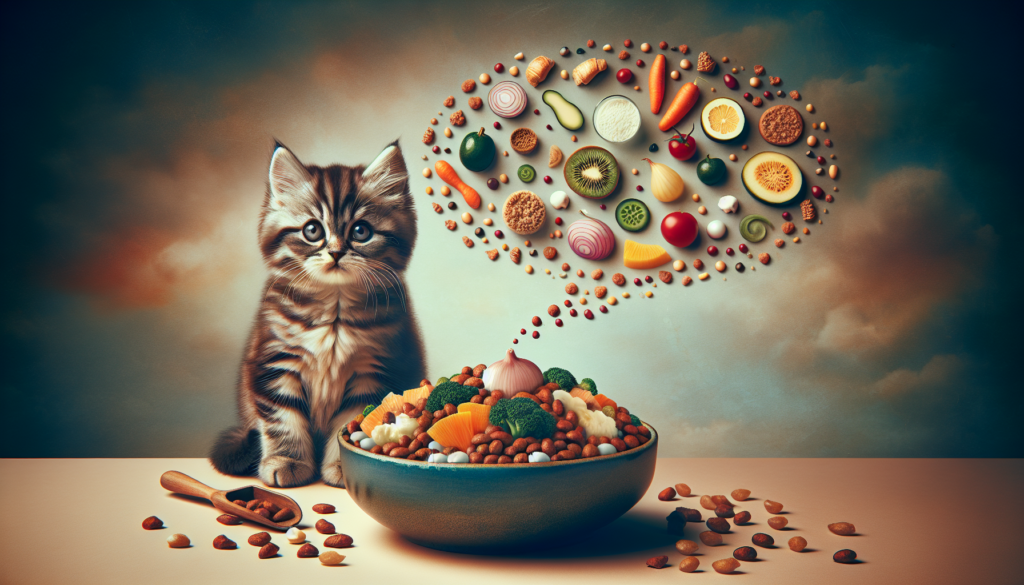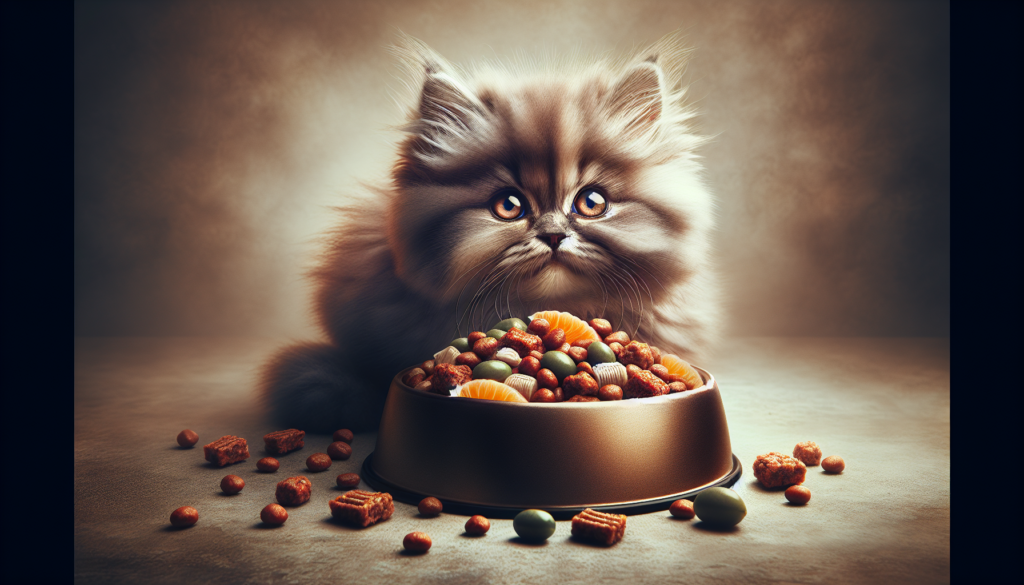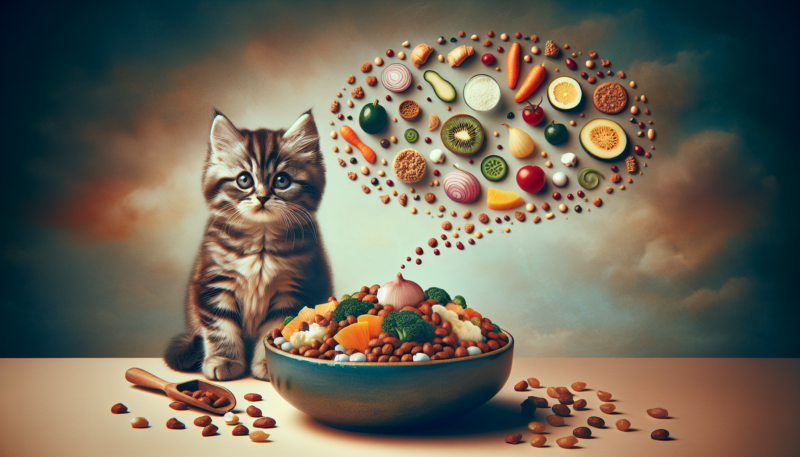Are you a proud owner of a beautiful Persian kitten? If so, you must be aware of the importance of providing them with the best nutrition to help them thrive and grow into healthy adult cats. In this article, we will explore the world of Persian kitten food and uncover the top options available to ensure your furry friend receives all the essential nutrients they need for a happy and fulfilling life.
Benefits of feeding Persian kittens a balanced diet
Importance of a balanced diet for Persian kittens
Feeding your Persian kitten a balanced diet is crucial for their overall health and well-being. Just like humans, kittens require specific nutrients to support their growth and development. A balanced diet ensures that your furry friend receives all the essential vitamins, minerals, and proteins they need to thrive. By providing proper nutrition, you can enhance their immune system, promote healthy growth, and prevent potential health issues in the future.
Nutritional requirements for Persian kittens
Persian kittens have unique nutritional requirements compared to other cat breeds. They require a diet that is rich in high-quality proteins, essential fatty acids, and a balanced mix of vitamins and minerals. Proteins are crucial for their muscle development, while fatty acids promote healthy skin and coat. Additionally, Persian kittens need adequate levels of taurine, an essential amino acid that supports their heart health and vision. To meet all these nutritional needs, it’s important to choose a cat food specifically formulated for Persian kittens.
Health benefits of a balanced diet for Persian kittens
Feeding your Persian kitten a balanced diet has numerous health benefits. Firstly, it helps maintain a healthy weight, which is important for their overall well-being and reduces the risk of obesity-related health issues. Secondly, a balanced diet supports their digestive health, ensuring proper nutrient absorption and minimizing the risk of gastrointestinal problems. Additionally, providing essential nutrients helps strengthen their immune system, making them less prone to illnesses and infections. Lastly, a balanced diet promotes healthy skin, a shiny coat, and bright eyes, showcasing your Persian kitten’s natural beauty.
Understanding the dietary needs of Persian kittens
Stage-specific nutritional requirements
As Persian kittens grow and mature, their nutritional needs change. It’s important to select cat food that caters to their specific life stage. For instance, kittens require more calories than adult cats to fuel their growth and high energy levels. Look for cat food labeled as “kitten” or “growth” formulas, as these are specially formulated to meet the needs of young kittens. As they transition into adulthood, their energy requirements decrease, and you can switch to adult cat food accordingly.
Protein needs for Persian kittens
Protein is an essential component of a Persian kitten’s diet. It plays a vital role in their growth and development, providing the building blocks for healthy muscles, organs, and tissues. Look for cat foods that list high-quality animal proteins, such as chicken, turkey, or fish, as the main ingredients. These proteins provide the necessary amino acids that support your kitten’s overall health. Avoid cat foods that rely heavily on plant-based proteins, as these are often incomplete and less beneficial for growing kittens.
High-quality ingredients for Persian kitten food
When choosing cat food for your Persian kitten, prioritize high-quality ingredients. Look for cat food brands that use premium, human-grade ingredients with no artificial additives or fillers. Ingredients such as real meat, fruits, and vegetables provide a balanced and nutritious meal for your kitten. Additionally, avoid cat foods that contain excessive amounts of grains or carbohydrates, as Persian kittens have a lower tolerance for these ingredients. Opt for cat foods that are grain-free or have limited amounts of grains to support their digestion.

Choosing the right type of Persian kitten food
Wet food vs. dry food for Persian kittens
When it comes to choosing the right type of food for your Persian kitten, both wet food and dry food options have their advantages. Wet food has higher moisture content, which helps keep your kitten hydrated and can be beneficial for their urinary tract health. It also tends to be more palatable for picky eaters and can provide variety in flavors. On the other hand, dry food is more convenient and can help maintain dental health by promoting chewing and reducing tartar buildup. Ultimately, a combination of wet and dry food can be the best option, providing a balanced and enjoyable diet for your Persian kitten.
Importance of age-appropriate food for Persian kittens
As your Persian kitten grows, their dietary needs change. It’s essential to feed them age-appropriate food to ensure they receive the right balance of nutrients. Kitten-specific formulas are designed to provide the necessary nutrients for growth and development. These formulas often have higher levels of proteins, fats, and vitamins to support their energy requirements. As your kitten reaches adulthood, you can transition them to adult cat food, ensuring they receive the appropriate nutrition for their life stage.
Benefits of grain-free Persian kitten food
Grain-free cat food can be a beneficial option for Persian kittens, especially those with sensitivities or allergies. Persian kittens are known to have a higher risk of developing food allergies or intolerances, and grains are a common trigger. By opting for grain-free cat food, you reduce the risk of potential gastrointestinal issues, skin irritations, or other allergic reactions. Grain-free formulas often use alternative carbohydrate sources, such as sweet potatoes or peas, which are easier for kittens to digest and provide a lower risk of adverse reactions.
Top brands for Persian kitten food
Royal Canin Persian Kitten Dry Cat Food
Royal Canin is a renowned brand known for producing breed-specific cat food. Their Persian Kitten Dry Cat Food is specifically formulated to meet the unique nutritional needs of Persian kittens. It features a combination of high-quality proteins, vitamins, and minerals to support healthy growth and enhance their natural beauty. This cat food also includes nutrients that promote healthy digestion and reduce litter box odor, providing a well-rounded meal for your Persian kitten.
Hill’s Science Diet Kitten Dry Cat Food
Hill’s Science Diet is a trusted name in the pet food industry. Their Kitten Dry Cat Food is another excellent option for Persian kittens. This formula contains a precise blend of high-quality ingredients to support healthy development and immune function. With added antioxidants and natural DHA for brain development, this cat food prioritizes your kitten’s overall health. It is also easily digestible, ensuring optimal nutrient absorption.
Purina Pro Plan Focus Kitten Canned Wet Cat Food
Purina Pro Plan is a reputable brand that offers a wide range of cat food options. Their Focus Kitten Canned Wet Cat Food is a popular choice for many Persian kitten owners. This wet food formula is made with real chicken or turkey as the main ingredient, providing essential protein for your kitten’s growth. It is also packed with vitamins, minerals, and taurine to support their overall health and development. The moist texture makes it easier for kittens to chew and digest.

Homemade Persian kitten food recipes
Cooked chicken and rice recipe for Persian kittens
If you prefer to prepare homemade food for your Persian kitten, a simple cooked chicken and rice recipe can provide the necessary nutrition. Start by boiling boneless, skinless chicken breast until fully cooked. Once cooked, shred the chicken into small pieces. In a separate pot, cook plain white rice according to package instructions. Mix the shredded chicken with the cooked rice and let it cool before serving to your kitten. Ensure that the chicken is fully cooked and there are no seasonings or additives added.
Fish and sweet potato recipe for Persian kittens
Another homemade option for your Persian kitten is a fish and sweet potato recipe. Begin by cooking a boneless, skinless fish, such as salmon or cod. Ensure that the fish is thoroughly cooked and there are no bones present. Mash cooked sweet potatoes separately. Once both the fish and sweet potatoes are cooked, mix them together and let the mixture cool before serving. This recipe provides a combination of proteins, healthy fats, and carbohydrates for your kitten.
Vegetarian recipe options for Persian kittens
While cats are obligate carnivores, meaning their bodies require certain nutrients that can only be obtained from animal sources, it is possible to supplement their diet with vegetarian options. Consult with your veterinarian before introducing a vegetarian diet to ensure your Persian kitten’s nutritional needs are adequately met. For a vegetarian option, you can mix cooked lentils or beans with cooked and mashed vegetables, such as carrots, peas, and sweet potatoes. However, it is important to note that vegetarian diets may require additional supplementation to ensure your kitten receives essential nutrients like taurine and vitamin B12.
Tips for transitioning your Persian kitten to a new food
Gradual introduction of new food
When transitioning your Persian kitten to a new food, it’s important to do so gradually. Suddenly changing their diet can cause digestive upset and reluctance to eat. Start by mixing a small amount of the new food with their current food and gradually increase the proportion over several days or weeks. This slow transition allows their digestive system to adjust and reduces the chances of gastrointestinal issues.
Mixing old and new food for Persian kittens
During the transition period, it is beneficial to mix the old and new food together. This ensures that your Persian kitten still receives the necessary nutrients while introducing the new food. Gradually increase the proportion of the new food over time and decrease the amount of the old food until your kitten is fully transitioned to the new food.
Monitoring your Persian kitten’s response to the new food
Keep a close eye on your Persian kitten’s response to the new food. Monitor their appetite, digestion, and overall behavior. Any significant changes in appetite, vomiting, diarrhea, or unusual behavior should be immediately reported to your veterinarian. It is normal for kittens to experience a slight adjustment period, but if any concerning symptoms persist, consult with a professional for guidance.
Signs of a healthy Persian kitten
Shiny coat and healthy skin
A healthy Persian kitten will have a shiny, lustrous coat and healthy skin. Their fur should be soft, smooth, and free from excessive shedding or dryness. Proper nutrition plays a vital role in maintaining a healthy coat and skin. If you notice any changes in their coat quality or excessive itching, it may be a sign of an underlying dietary issue and should be addressed with your veterinarian.
Energetic and playful behavior
A healthy Persian kitten should display energetic and playful behavior. They should have bursts of energy and engage in regular play sessions. Lethargy or a sudden decrease in activity levels could be a red flag indicating a potential health issue or nutritional deficiency. If you notice any changes in your kitten’s energy levels, consult with your veterinarian for further evaluation.
Normal digestion and litter box habits
Observing your kitten’s digestion and litter box habits is essential for assessing their overall health. A healthy Persian kitten should have regular bowel movements that are firm and well-formed. Any signs of diarrhea, constipation, or changes in litter box habits should be promptly addressed with your veterinarian. Proper nutrition plays a crucial role in maintaining healthy digestion, and any abnormalities should not be ignored.
Common health issues in Persian kittens
Polycystic kidney disease (PKD)
Polycystic kidney disease (PKD) is a genetic disorder that is relatively common in Persian cats, including kittens. It is characterized by the development of fluid-filled cysts in the kidneys, which can lead to kidney failure if left untreated. While a balanced diet cannot cure or prevent PKD, it is essential to provide proper nutrition to support overall kidney health and minimize the risk of exacerbating the condition. Regular veterinary check-ups and genetic testing can help identify and manage PKD in Persian kittens.
Eye problems in Persian kittens
Persian kittens are prone to various eye problems, such as excessive tearing, eye infections, and corneal ulcers. These issues can be influenced by genetics, diet, and environmental factors. Providing a balanced diet that promotes eye health, including antioxidants and omega-3 fatty acids, can help reduce the risk of eye problems. Regular eye examinations by a veterinarian are also crucial to detect any potential issues early and prevent further complications.
Dental issues and jaw deformities
Persian kittens may experience dental issues and jaw deformities due to their unique facial structure and brachycephalic (short-nosed) characteristics. Their teeth may be overcrowded or misaligned, leading to plaque build-up, gum disease, and discomfort. Providing a balanced diet that supports dental health, such as dry kibble or dental treats, can help maintain oral hygiene. Regular dental check-ups and professional cleanings are essential to address any dental issues and prevent long-term complications.
Consulting your veterinarian for dietary advice
Benefits of professional guidance for Persian kitten food
Consulting your veterinarian for dietary advice is highly recommended when it comes to feeding your Persian kitten. They can provide valuable insights tailored to your kitten’s specific needs and health conditions. Veterinarians have the expertise and knowledge to recommend appropriate cat food brands, formulas, and feeding schedules that will optimize your kitten’s health and well-being.
Customized diet plans for specific health conditions
If your Persian kitten has specific health conditions or dietary restrictions, a veterinarian can customize a diet plan to meet their individual needs. For instance, if your kitten has food allergies, gastrointestinal issues, or is at risk of developing certain health conditions, a tailored diet plan can help manage and prevent these issues. Your veterinarian can also provide guidance on portion control, feeding frequency, and any necessary supplementation.
Monitoring growth and weight management
Regular veterinary check-ups play a crucial role in monitoring your Persian kitten’s growth and weight management. Veterinarians can track their growth milestones, monitor their weight gain, and assess their overall development. They can make adjustments to the diet based on their growth trajectory, ensuring your kitten is growing at a healthy rate and not becoming overweight or undernourished.
Conclusion
By feeding your Persian kitten a balanced diet, you provide them with the foundation for a healthy and happy life. A balanced diet ensures they receive the necessary nutrients to support their growth, development, and overall well-being. Understanding their specific dietary needs, choosing appropriate cat food, and consulting with your veterinarian for guidance are essential steps in providing the best Persian kitten food. By prioritizing their nutritional needs, you promote their overall health, maintain their natural beauty, and enhance their quality of life.
